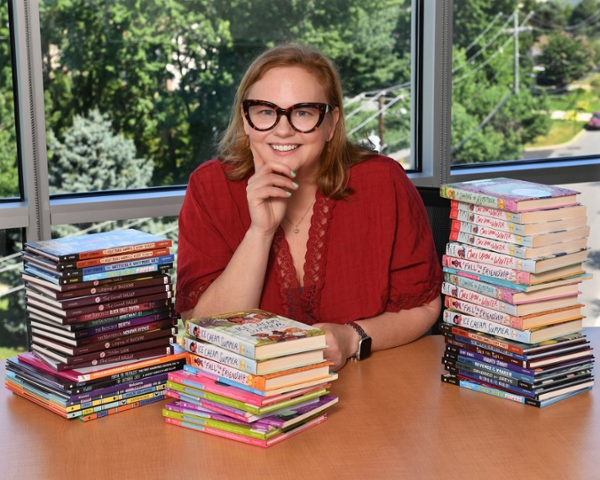Sixty books in, Prof. Megan Atwood practices the power of storytelling
Sixty books in, Prof. Megan Atwood practices the power of storytelling

Telling stories well, consistently and productively takes as much energy, commitment and drive as the work of any researcher anywhere.
Just ask Megan Atwood.
A professor of creative writing in the Ric Edelman College of Communication & Creative Arts, Atwood has published an astounding 60 books, mainly in the mystery, horror and sci-fi/fantasy genres, and loves nothing more than teaching and inspiring her students to find their writing voice too.
Atwood largely writes for a younger readership and, like many fiction writers, doesn’t always know where a story will go until it gets there.
“It sort of depends on the project,” Atwood said. “I always have a loose structure in mind but it almost never goes exactly how I think it will. Characters make decisions based on how they’re crafted and it doesn’t always follow a plot.”
Which is part of the fun, she said.
“It’s one reason why I love writing,” she said. “The story kind of just unfolds and it’s exciting and fascinating to see where it’s going to go.”
Atwood, who teaches Creative Writing I and Genre Writing as well as special topics in publishing and writing for children, often works on two or three projects simultaneously.
The author of a young adult horror book, “The Devils You Know,” from Soho Teen, and a middle grade series, “The Orchard Novels,” from Simon & Schuster, Atwood has enjoyed a rewarding career not only as a writer but as an acquisitions editor, developmental editor, managing editor and literary agent.
A longtime author for both the trade, or retail market, and the library market, Atwood abhors a recent trend in some American communities to burn and ban books, even from school libraries.
Some of the books contain LGBTQ+ and/or racial storylines that speak to the lived experiences of many readers and, Atwood believes, preventing access to them is unconscionable.
“When you write for kids you’re trying to allow them to see themselves in a book,” she said.
When self-appointed censors “yank books away that could provide a mirror for some students that could help them get through childhood, it’s incomprehensible.”
Atwood believes her well of experience as an author and industry professional provides a deep vein of teaching material and she draws on it all to help her students become the writers they dream of being.
“My most important advice to students hoping to launch their own writing career is to just keep writing,” she said.
She said all writers, but especially fiction writers, have a tendency at some point to question their ability, but it’s a tendency they need to fight.
“It’s not a super productive question to say am I good writer?” she said. “The more important question is, did I show up today? Am I writing?”